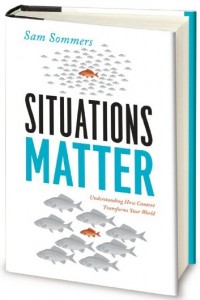On SITUATIONS MATTER and Activism

SITUATIONS MATTER: Understanding How Context Transforms Your World (Riverhead 2011) by Sam Sommers, like the recent other nonfiction books I’ve read (and who am I kidding? The last novel I read was THE LIFE OF PI, and before that, THE CURIOUS INCIDENT OF THE DOG IN THE NIGHT-TIME, so that tells you how frequently I read fiction), discusses how you might not be who you think you are. What I mean is that some people, and in my experience they’re the self-help crowd, believe that there’s an “authentic self.” We can discover said self if we pay attention in all of the right ways, and we should in fact make it a priority to live as our authentic selves once we’ve defined them.
The only problem with that, as you find when you really do pay attention, is that . . . wait for it . . . situations matter. Context matters. I know a lot of people who have a difficult time with this notion because they like to think of their innermost self, whatever that is, as fixed. But like intelligence and creativity, who you are is malleable. Your personality is malleable. Your character is malleable. You might do things you don’t think you’d do depending on the situation: depending on what’s around, who is around and even who isn’t around.
“The real moral of this book, however, is that recognizing the power of situations gives us a leg up in a range of endeavors” (43).
People often ask me: “As a vegan or someone who doesn’t want to eat animals any longer, what do I say at Thanksgiving?” And my answer to that, and similar what-do-I-say and what-do-I-do questions, is always: “That depends.” I have to know who’s there, what the relationships are, what’s the history about the location or past holidays. There’s so much that informs and influences what every person in the room says and does that you need as much information as possible in order to say/do the most effective thing. Know your audience, you’re a salesperson.
If we know anything, though, we know that people hardly know themselves, and that makes Know Your Audience a bit of a tall order. What you can know is (your interpretation of) what has occurred and what has been said in the past. Just remember that what you think you know based on what you have seen is never, ever the whole story. It doesn’t tell you what someone “is capable of” (45). The obvious example, which Sommers uses, is the serial killer whose neighbors would never have guessed. They thought they knew him and he’d never be capable of that. Or Bernie Madoff, ripping of his own community. Or beloved nonprofit executives who misuse donor funds.
Let’s turn that around, though. I think about all of the discussions on Facebook around a photo of a hunter. Any hunter. Pick one. There are often hateful comment threads about how despicable these people are. Almost as despicable as people who slaughter animals. The commenters behave as if they know who the people in the photos are and have the capacity to be from one snapshot of a moment in their lives. But I have two words for you. Howard Lyman. And two more: Harold Brown. Contrary to conventional wisdom, people change. All the time. Therefore, to treat anyone–or let’s say most people (there are some sadists out there)–as if there’s no hope and we should not only not try, but we should publicly vilify them, is short-sighted.
This is not about loving the abuser, in case your mind was going in that direction; it’s about giving people a chance to change and about acknowledging that drawing conclusions about someone based on a moment of their lives might not be a good idea.
Reading Sommers makes you face the fact (statistical, that is), that there are situations in which you just might not help someone who needs help. You don’t think that would ever happen, but if you just arrived to a crowd of people, none of whom were helping someone who might need help, you just might not help either for a variety of reasons. The people around you have a dramatic effect on how you think and act (86).
I think we all realize the impact culture, gender and race have on what we think and say and do (and Sommers devotes a chapter to each). But there are other, more subtle factors that influence how and what we think and what we do and why we do it.
This is a fun, easy read, and an eye opener as well. If you liked Sway, by Ori and Rom Brafman, you’ll love SITUATIONS MATTER.
http://www.youtube.com/watch?v=90YC_yReluc



